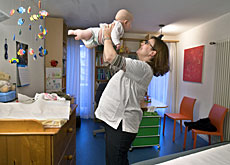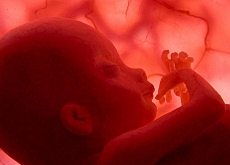Mental health project gets green light

A pioneering and controversial mental health study involving 3,000 Swiss households will begin later this year after being given the official go-ahead.
But the Swiss Etiological Study of Adjustment and Mental Health (Sesam) will have to abandon genetic testing of the children taking part after massive opposition.
Basel-based Sesam, a worldwide first, was approved as a national centre of competence in research by the government in 2005.
The aim is to collect data about the participants’ mental health by observing them over a period of 20 years, taking into account biological, social and psychological factors.
Children taking part in the project will come under special scrutiny, from 12 weeks after conception. The researchers already know that many mental and psychiatric problems have their origin in childhood, but they do not necessarily know why.
But there will be no analysis of the children’s genes as originally planned after a decision by the joint ethics committee of cantons Basel City and Basel Country.
Last year, the Basel Campaign against Gene Technology submitted a petition with 12,000 signatures against the project, claiming it had serious legal and ethical flaws.
The association was particularly concerned about the genetic analysis element, pointing out that children could not give permission for their DNA to be examined and researched.
Full agreement required
The committee agreed, deciding that genetic analysis can only take place after the age of 18 with the participants’ full agreement and a complete presentation of the benefits and disadvantages.
The committee’s members stipulated these conditions, considering that the impact of knowing that one shares the same genetic characteristics as a family member suffering from a mental disease could be a burden to handle.
“Individual interests are more important than the project,” committee president Hans Kummer pointed out on Monday.
Sesam will handle data from the gene analysis anonymously, but participants will have the right to know their individual results.
The Basel Campaign has hailed the decision against genetic testing as a victory against the researchers, saying in a press release that the study had lost one of its key elements and that funding for Sesam should now be dropped.
The committee is also demanding that the researchers monitor any negative effects of the study on participants. Although Sesam is supposed to be an observation of mental health only, the scientists are being asked to intervene if necessary.
The deputy director of the project, Alexander Grob, said the ethics committee’s recommendations would be accepted and that the researchers were ready to begin their work.
He commented that the ban on DNA testing on children did not influence the study fundamentally, adding that as DNA did not change, it could be analysed retrospectively.
He therefore hoped that participants would accept a DNA analysis once they had reached their 18th birthday.
Participants will be recruited in the coming months.
swissinfo with agencies
Sesam will follow 3,000 families over 20 years, trying to identify the parameters of psychological development during a person’s life.
Children will be included in the study 12 weeks after conception.
The project is being piloted by Basel University, but also includes researchers from Bern, Zurich, Geneva and Lausanne.
Sesam’s budget for the first four years is SFr22.8 million ($18.8 million) with slightly less than half coming from the Swiss National Science Foundation.

In compliance with the JTI standards
More: SWI swissinfo.ch certified by the Journalism Trust Initiative











You can find an overview of ongoing debates with our journalists here . Please join us!
If you want to start a conversation about a topic raised in this article or want to report factual errors, email us at english@swissinfo.ch.